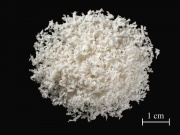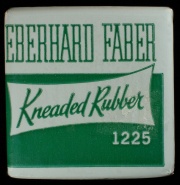Difference between revisions of "Eraser"
(username removed) |
|||
| Line 2: | Line 2: | ||
== Description == | == Description == | ||
| − | A piece of rubber, cloth, or felt, used for removing dirt and marks made with a pen, pencil, or chalk. Early erasers were abrasive type materials such as [ | + | A piece of rubber, cloth, or felt, used for removing dirt and marks made with a pen, pencil, or chalk. Early erasers were abrasive type materials such as [[pumice]] or [[cuttlebone|cuttlefish bone]] that removed a thin layer of the paper or parchment. Moistened leather pads and [[bread eraser|breadcrumbs]] were also used to remove water soluble inks. In the latter part of the 18th century, natural [[rubber eraser|rubber erasers]] were introduced in France. Rubber, [[fastice]], and the more recent [[vinyl eraser|vinyl erasers]], often contain fillers and soft abrasives to assist in removing inks and pigments. These types of erasers may leave trace amounts of residue ([[eraser crumbs]]) that may later stain paper. |
| − | See also: [ | + | See also: [[Design® Artgum® eraser]]; [[Absorene®]]; [[Draft Clean]]; [[India rubber]]; [[Fybrglass eraser]]; [[Design® Kneadable Rubber]]; [[Magic Rub® eraser]]; [[Pink Pearl® eraser]]; [[Tapeten Reiniger eraser]]; [[gum eraser]]; |
[[File:Eberhard faber.jpg|thumb|Eberhard Faber kneaded rubber eraser]] | [[File:Eberhard faber.jpg|thumb|Eberhard Faber kneaded rubber eraser]] | ||
| + | |||
== Synonyms and Related Terms == | == Synonyms and Related Terms == | ||
Revision as of 09:47, 15 January 2014
Description
A piece of rubber, cloth, or felt, used for removing dirt and marks made with a pen, pencil, or chalk. Early erasers were abrasive type materials such as Pumice or cuttlefish bone that removed a thin layer of the paper or parchment. Moistened leather pads and breadcrumbs were also used to remove water soluble inks. In the latter part of the 18th century, natural rubber erasers were introduced in France. Rubber, Fastice, and the more recent vinyl erasers, often contain fillers and soft abrasives to assist in removing inks and pigments. These types of erasers may leave trace amounts of residue (Eraser crumbs) that may later stain paper.
See also: Design® Artgum® eraser; Absorene®; Draft Clean; India rubber; Fybrglass eraser; Design® Kneadable Rubber; Magic Rub® eraser; Pink Pearl® eraser; Tapeten Reiniger eraser; Gum eraser;
Synonyms and Related Terms
rubber (Br.); viskelæder (Dan.); Radiergummi (Deut.); goma de borrar (Esp.); radergummi (Sven.); Design® Artgum [Faber-Castell]; Absorene® [Absorene]; Draft Clean [GH Smith]; fastice; India rubber; Design® Kneadable Rubber [Faber-Castell]; Magic Rub® [Faber-Castell]; Pink Pearl® eraser [Faber-Castell]; Mars Plastic eraser [Staedler]
Additional Information
° E.Estabrook "Considerations of the Effect of Erasers on Cotton Fabric" JAIC 28:79-96, 1989. Link ° E. J. Pearlstein, D. Cabelli, A. King, & N. Indictor, "Effects of Eraser Treatment on Paper" JAIC 22(1):1-12, 1982. Link
Additional Images
Authority
- Marjorie Shelley, The Care and Handling of Art Objects, The Metropolitan Museum, New York, 1987
- Hermann Kuhn, Conservation and Restoration of Works of Art and Antiquities, Butterworths, London, 1986
- Wikipedia, the free encyclopedia, at http://www.wikipedia.com Comment: http://en.wikipedia.org/wiki/Eraser (Accessed Nov. 2, 2005)
- Random House, Webster's Encyclopedic Unabridged Dictionary of the English Language, Grammercy Book, New York, 1997
- The American Heritage Dictionary or Encarta, via Microsoft Bookshelf 98, Microsoft Corp., 1998







